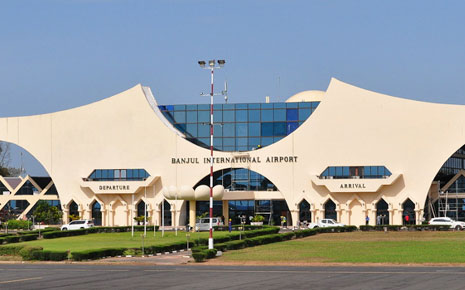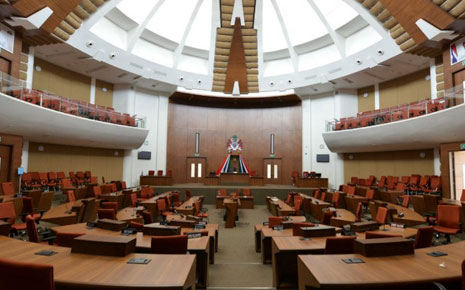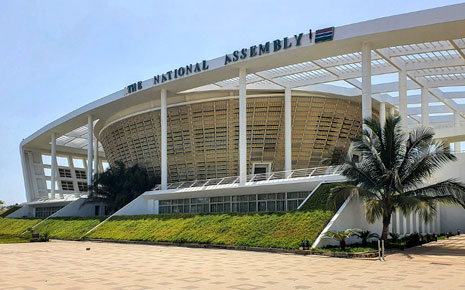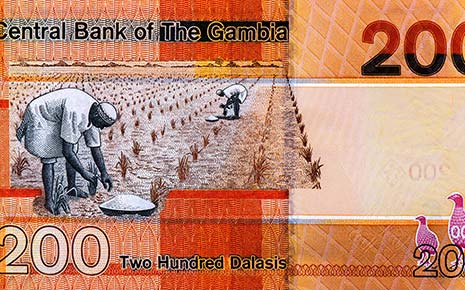Country Profile
The Gambia, known as the “Smiling Coast of Africa,” is a small West-African nation surrounded by Senegal and bordering the Atlantic Ocean. It spans approximately 11,300 square kilometres and boasts about 80 kilometres of coastline. The River Gambia runs through the entire country, making The Gambia an ideal gateway to the greater West Africa region. It is the smallest non-island African country and is recognized for its political stability, liberal trade policies, and market-based economy.
The Gambia’s GDP was estimated at USD 2.34 billion in 2023, reflecting strong post-pandemic recovery and economic resilience. Prior to the COVID-19 pandemic, the country experienced robust growth with real GDP growth rates of 7% in 2018 and 6% in 2019. While the pandemic caused a contraction of 0.2% in 2020, swift containment measures and government reforms have positioned the economy for recovery. The GDP growth rate rebounded to 5.3% in 2023, up from 4.9% in 2022. Inflation, while affected by global economic pressures, is projected to moderate to single digits by the end of 2024 after peaking at 16.97% in 2023.

The Gambia's location along the Atlantic, pristine beaches, ideal climate, and proximity to Europe have made it a favoured tourist destination in West Africa. The tourism sector accounts for approximately 20% of GDP, driven by Eco-tourism and private sector investments in sustainable travel. It remains a top priority for the government. The broader services sector—including tourism, trade, transport, and communications—contributes up to 65% of GDP. Agriculture, a vital economic pillar, accounts for approximately 30% of GDP, employing nearly half the workforce and serving as the backbone for rural livelihoods.
The Gambia has also developed into a sub-regional re-export hub, capitalizing on its liberal trade policies and strategic location. The Port of Banjul handles about 90% of the country’s trade and continues to benefit from modernization efforts, including expanded capacity and streamlined operations. As part of the Economic Community of West African States (ECOWAS), The Gambia enjoys access to a regional market of over 300 million consumers.
Sources: World Bank; GIEPA; Macrotrends; International Monetary Fund (IMF); African Development Bank (AfDB)

INFRASTRUCTURAL DEVELOPMENT
The Government of The Gambia remains highly committed to continuous improvements in infrastructure across the country, recognizing its critical role in fostering economic development and regional integration.
Significant progress has been made in enhancing basic infrastructure, including the expansion of the road network, telecommunications, seaport, airport, and electricity grid. Ongoing infrastructure development projects aim to improve the business environment and facilitate trade and investment:
- Strategic Road Network Expansion: Major improvements to the national road network are underway to enhance connectivity, including the Trans-Gambia Highway, which serves as a key corridor for trade and transportation within the Economic Community of West African States (ECOWAS). The completion of the Senegambia Bridge has further strengthened north-south connections and eased cross-border trade.
- Port of Banjul Modernization and Expansion: The Port of Banjul, which handles approximately 90% of The Gambia’s trade, is undergoing transformative upgrades. The ongoing expansion project includes increasing container capacity, modernizing port infrastructure, and streamlining operations with a fully computerized cargo documentation system. These enhancements aim to position the port as a leading logistics hub in West Africa, serving neighboring countries such as Mali, Guinea-Bissau, Senegal, and others.
- Banjul International Airport Upgrades: Recent upgrades to Banjul International Airport, supported by a $14 million investment, have modernized its facilities and runways to meet international standards. The government is also planning further improvements, including a new airport management company and partnerships under a Public-Private Partnership (PPP) model to optimize operations and service delivery.
- Energy Infrastructure Development: Projects like the Jambur Solar Power Station (23 MW), commissioned in March 2024, and the planned Soma Solar Power Station (150 MW) reflect The Gambia's commitment to expanding electricity access and transitioning to renewable energy sources. Investments in transmission and distribution infrastructure are ongoing to support these efforts.
- Telecommunications Advancements: The government is investing in the expansion of fiber-optic networks and mobile broadband services to improve digital connectivity. These upgrades aim to bridge the digital divide, particularly in rural areas, and support the growing ICT sector.
The Gambia’s primary ports of entry, Banjul International Airport and the Port of Banjul, continue to play vital roles in facilitating trade and tourism. With significant investments in infrastructure and streamlined processes, these ports are well-positioned to support the country’s ambitions as a regional trade and logistics hub.

GOVERNMENT POLICY
The Gambia, celebrated for its peace and political stability, gained independence in 1965 and functions as a multiparty republic with a single legislative body. In response to evolving challenges, the government has introduced the Recovery-Focused National Development Plan (RF-NDP) 2023–2027, locally known as "YIRIWAA," a Mandinka term meaning development. This plan succeeds the National Development Plan 2018–2021/22 and aims to guide the nation's recovery from the COVID-19 pandemic, climate change, and other shocks.
The RF-NDP 2023–2027 outlines several strategic priorities:
- Good Governance and Human Rights: Restoring good governance, upholding human rights, and empowering citizens through decentralization and local governance.
- Economic Stabilisation and Transformation: Stabilising the economy, stimulating growth, and transforming economic structures to enhance resilience and prosperity.
- Agricultural and Fisheries Modernisation: Modernising agriculture and fisheries to achieve sustained economic growth, food and nutritional security, and poverty reduction.
- Human Capital Development: Investing in the Gambian people through improved education and health services, and fostering a caring society.
- Infrastructure and Energy Services: Building infrastructure and restoring energy services to power the economy.
- Inclusive Tourism: Promoting inclusive and culture-centered tourism for sustainable growth.
- Youth Empowerment: Reaping the demographic dividend through the empowerment of youth.
- Private Sector Development: Positioning the private sector as the engine of growth, transformation, and job creation.
The RF-NDP 2023–2027 adopts a "whole of society" approach, articulating the medium-term transformational aspirations of the country.
It aligns with regional and international frameworks, including the Economic Community of West African States (ECOWAS) Vision 2050, the African Union Agenda 2063, and the Sustainable Development Goals (SDGs).
This comprehensive plan reflects The Gambia's commitment to fostering a prosperous and equitable society, laying the foundation for sustainable development and resilience against future challenges.
Sources: https://mofea.gov.gm/ ;https://ndp.gm/

DEVELOPMENTS IN THE LEGAL SYSTEM TO IMPROVE BUSINESS CONFIDENCE
The Gambia has undertaken significant legal reforms to enhance its business environment and bolster investor confidence. Key developments include:
- Decentralization of the Judicial System: Efforts have been made to decentralize judicial functions, improving access to justice across various regions. This approach ensures that legal services are more readily available to businesses and individuals nationwide.
- Alternative Dispute Resolution (ADR) Mechanisms: The establishment of ADR systems, such as mediation and arbitration, provides efficient avenues for resolving commercial disputes. These mechanisms offer cost-effective and timely solutions, reducing the burden on traditional courts and fostering a more amicable business climate.
- Enhancements in Legal Case Management: Improvements in the administration and scheduling of legal cases have been implemented to expedite judicial processes. The adoption of digital record-keeping and case management systems has streamlined operations, leading to more predictable and transparent legal proceedings.
- Strengthening of Intellectual Property Rights: The development and enforcement of legislation concerning copyright and property rights have been prioritized. These measures protect the intellectual assets of businesses, encouraging innovation and investment by ensuring that proprietary information and creations are legally safeguarded.
Collectively, these reforms demonstrate The Gambia's commitment to creating a robust legal framework that supports business operations and fosters a conducive environment for economic growth.
Source: https://generisonline.com/understanding-recent-legal-reforms-in-the-gambia-an-in-depth-review/

INSTITUTIONAL DEVELOPMENT TO SUPPORT BUSINESSES AND PROMOTE A LEVEL PLAYING FIELD
The Gambia has undertaken significant institutional reforms to support businesses and ensure a level playing field. Several key institutions are dedicated to enhancing the country's business environment:
- Gambia Competition and Consumer Protection Commission (GCCPC): Established to promote fair competition and protect consumer rights, the GCCPC ensures that businesses operate on an equitable basis, fostering a healthy market environment.
- Public Utilities Regulatory Authority (PURA): PURA oversees the regulation of public utilities, including electricity, water, and telecommunications. By ensuring efficient service delivery and fair pricing, PURA creates a conducive environment for business operations.
- Gambia Investment and Export Promotion Agency (GIEPA): GIEPA is tasked with attracting and facilitating investment, promoting exports, and supporting enterprise development. It serves as a one-stop shop for investors, streamlining processes and providing essential support services.
- Alternative Dispute Resolution Secretariat (ADRS): The ADRS offers mechanisms such as mediation and arbitration to resolve commercial disputes efficiently. This approach reduces the burden on traditional courts and provides businesses with timely and cost-effective solutions.
- Credit Reference Bureau (CRB): Operated under the Central Bank of The Gambia, the CRB collects and disseminates credit information, aiding financial institutions in assessing creditworthiness. This system enhances access to credit for businesses by reducing information asymmetry.
- Gambia Standards Bureau (TGSB): TGSB develops and enforces standards to ensure the quality and safety of products and services. By aligning with international standards, it facilitates trade and boosts consumer confidence.
These institutions collectively contribute to a robust and supportive framework for businesses in The Gambia, promoting transparency, efficiency, and sustainable economic growth.




